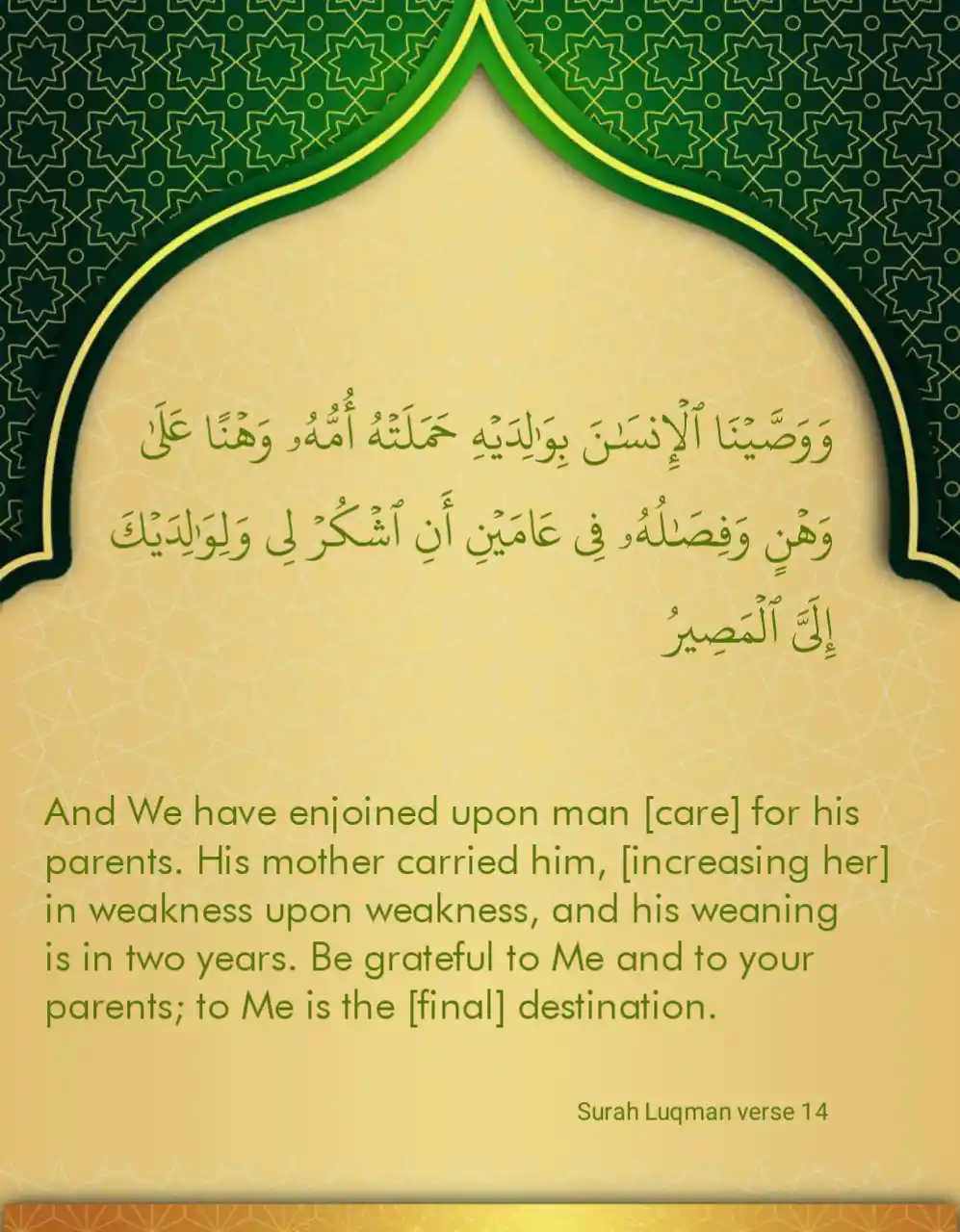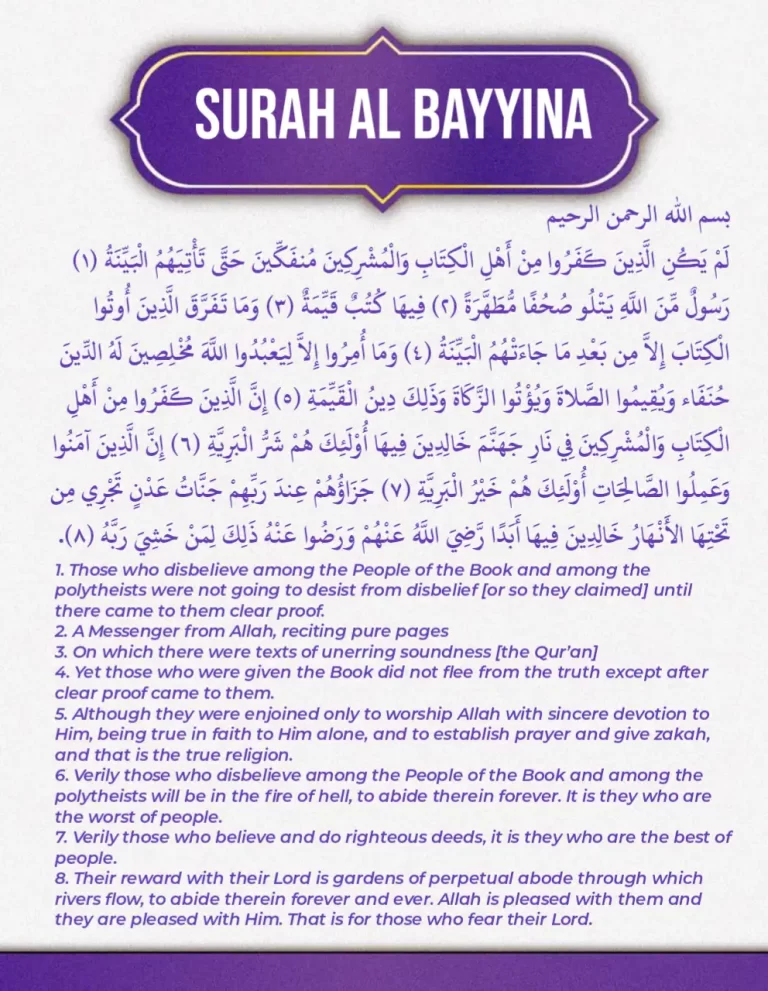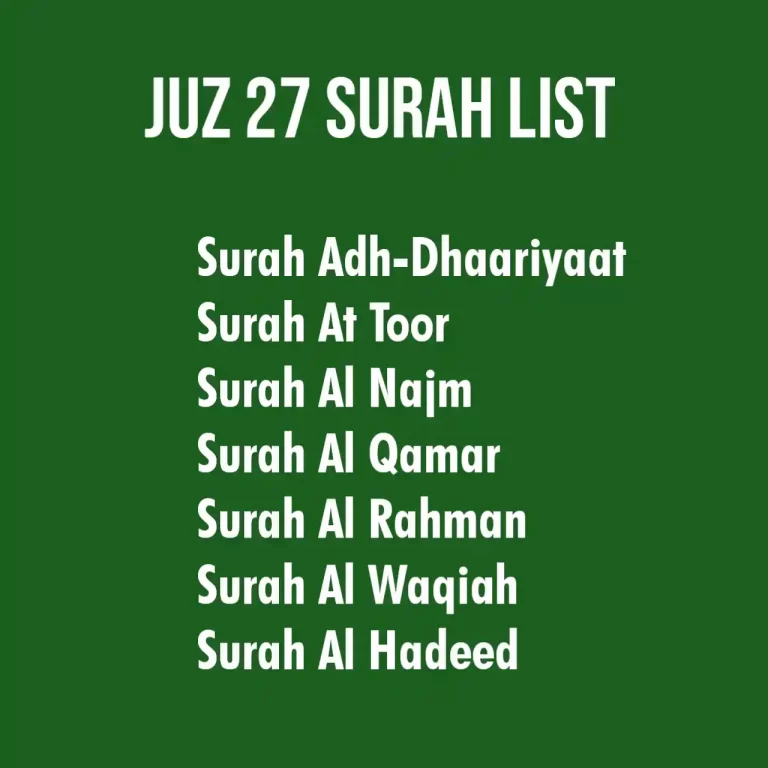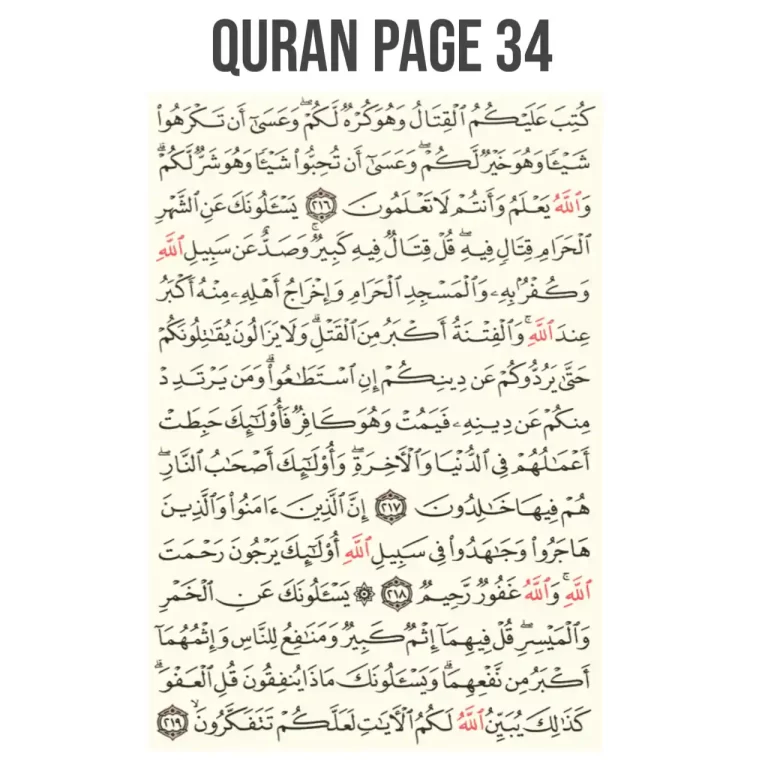8 Quran Verses About Mother In Arabic And Meanings
A mother’s role in Islam is monumental. A bond between a mother and a child is no doubt the most cherished and forms the basis of all life.
Advertisements
A mother carries a child in her womb for nine months, gives birth to it, nurtures the child, many times sacrificing her needs for the sake of the child.
There are Quran verses about mother and the Hadith which highlight the importance of parents, in particular the mother.
8 Quran Verses About Mother
1. Surah Isra’ verse 23
- وَقَضَىٰ رَبُّكَ أَلَّا تَعۡبُدُوٓاْ إِلَّآ إِيَّاهُ وَبِٱلۡوَٰلِدَيۡنِ إِحۡسَٰنًاۚ إِمَّا يَبۡلُغَنَّ عِندَكَ ٱلۡكِبَرَ أَحَدُهُمَآ أَوۡ كِلَاهُمَا فَلَا تَقُل لَّهُمَآ أُفٍّ وَلَا تَنۡهَرۡهُمَا وَقُل لَّهُمَا قَوۡلًا كَرِيمًا
And your Lord has decreed that you worship not except Him, and to parents, good treatment. Whether one or both of them reach old age [while] with you, say not to them [so much as], “uff,” and do not repel them but speak to them a noble word.

This verse is the he Command to Worship Allah Alone and to be Dutiful to One’s Parents.
Advertisements
Allah says, And your Lord has Qada (decreed) that you worship none but Him. Allah commands us to worship Him alone, with no partner or associate.
Allah says: And that you be dutiful to your parents.
Here He commands good treatment of parents, as He says elsewhere:
Give thanks to Me and to your parents. Unto Me is the final destination.
Surah Luqman:14
If one of them or both of them attain old age in your life, say not to them a word of disrespect, means, do not let them hear anything offensive from you, not even say “Uff!” which is the mildest word of disrespect,
And do not reprimand them, means, do not do anything horrible to them.
Advertisements
When Allah forbids speaking and behaving in an obnoxious manner, He commands speaking and behaving in a good manner, so He says: but address them in terms of honor.
Meaning gently, kindly, politely, and with respect and appreciation.
2. Surah Ahqab verse 15
- وَوَصَّيۡنَا ٱلۡإِنسَٰنَ بِوَٰلِدَيۡهِ إِحۡسَٰنًاۖ حَمَلَتۡهُ أُمُّهُۥ كُرۡهًا وَوَضَعَتۡهُ كُرۡهًاۖ وَحَمۡلُهُۥ وَفِصَٰلُهُۥ ثَلَٰثُونَ شَهۡرًاۚ حَتَّىٰٓ إِذَا بَلَغَ أَشُدَّهُۥ وَبَلَغَ أَرۡبَعِينَ سَنَةً قَالَ رَبِّ أَوۡزِعۡنِىٓ أَنۡ أَشۡكُرَ نِعۡمَتَكَ ٱلَّتِىٓ أَنۡعَمۡتَ عَلَىَّ وَعَلَىٰ وَٰلِدَىَّ وَأَنۡ أَعۡمَلَ صَٰلِحًا تَرۡضَىٰهُ وَأَصۡلِحۡ لِى فِى ذُرِّيَّتِىٓۖ إِنِّى تُبۡتُ إِلَيۡكَ وَإِنِّى مِنَ ٱلۡمُسۡلِمِينَ
- And We have enjoined upon man, to his parents, good treatment. His mother carried him with hardship and gave birth to him with hardship, and his gestation and weaning [period] is thirty months. [He grows] until, when he reaches maturity and reaches [the age of] forty years, he says,
- “My Lord, enable me to be grateful for Your favor which You have bestowed upon me and upon my parents and to work righteousness of which You will approve and make righteous for me my offspring. Indeed, I have repented to You, and indeed, I am of the Muslims.”

Allah’s Advice about the Parents
Advertisements
After mentioning that one must confess His Oneness, worship Him with sincerity, and remain upright in obeying Him, Allah follows that by giving instructions regarding the parents. These appear together in many places of the Qur’an.
Here Allah says, And We have enjoined on man to be dutiful and kind to his parents.
Meaning, `We have commanded him to treat them well and show compassion towards them.’
Abu Dawud At-Tayalisi recorded from Sa`d bin Abi Waqqas, may Allah be pleased with him, that his mother said to him:
“Hasn’t Allah commanded that you obey your parents Then I will not eat any food or drink any drink until you disbelieve in Allah.”
Thus she stubbornly abstained from eating and drinking, until they had to open her mouth with a stick. Then this Ayah was revealed,
(And We have enjoined on man to be dutiful and kind to his parents).
Allah continues, His mother bears him with hardship. Which means that the mother suffers hardship because of her child, such as fatigue, sickness, vomiting, heaviness, distress, and other forms of hardship that the pregnant women suffer.
And she delivers him with hardship, meaning, she also delivers him with hardship, suffering the pains of labor and their severity.
3. Surah Luqman verse 14
- وَوَصَّيۡنَا ٱلۡإِنسَٰنَ بِوَٰلِدَيۡهِ حَمَلَتۡهُ أُمُّهُۥ وَهۡنًا عَلَىٰ وَهۡنٍ وَفِصَٰلُهُۥ فِى عَامَيۡنِ أَنِ ٱشۡكُرۡ لِى وَلِوَٰلِدَيۡكَ إِلَىَّ ٱلۡمَصِيرُ
And We have enjoined upon man [care] for his parents. His mother carried him, [increasing her] in weakness upon weakness, and his weaning is in two years. Be grateful to Me and to your parents; to Me is the [final] destination.
In this ayah, Allah mentions how the mother brings the child up, and how she gets tired and suffers stress from staying up with the child night and day, to remind the son of her previous kind treatment of him.
4. Surah Abasa verse 35
- وَأُمِّهِۦ وَأَبِيهِ
And his mother and his father.
This verse talks about the Day a man flee from his brother. And from his mother and his father. And from his wife and his children.
Meaning, he will see them and then flee from them, and seek to get away from them because horror will be so great and the matter will be so weighty.
Qatadah said, “The most beloved and then the next most beloved, and the closest of kin and then the next closest of kin -due to the terror of that Day.”
5. Surah Mujadila verse 2
- ٱلَّذِينَ يُظَٰهِرُونَ مِنكُم مِّن نِّسَآئِهِم مَّا هُنَّ أُمَّهَٰتِهِمۡۖ إِنۡ أُمَّهَٰتُهُمۡ إِلَّا ٱلَّٰٓئِى وَلَدۡنَهُمۡۚ وَإِنَّهُمۡ لَيَقُولُونَ مُنكَرًا مِّنَ ٱلۡقَوۡلِ وَزُورًاۚ وَإِنَّ ٱللَّهَ لَعَفُوٌّ غَفُورٌ
Those who pronounce thihar among you [to separate] from their wives – they are not [consequently] their mothers. Their mothers are none but those who gave birth to them. And indeed, they are saying an objectionable statement and a falsehood. But indeed, Allah is Pardoning and Forgiving.
Allah said, they cannot be their mothers. None can be their mothers except those who gave them birth.
Meaning, when the husband says to his wife that she is like his mother, or the back of his mother etc., she does not become his mother. Rather his mother is she who gave birth to him.
6. Surah Ahzab verse 4
- مَّا جَعَلَ ٱللَّهُ لِرَجُلٍ مِّن قَلۡبَيۡنِ فِى جَوۡفِهِۦۚ وَمَا جَعَلَ أَزۡوَٰجَكُمُ ٱلَّٰٓئِى تُظَٰهِرُونَ مِنۡهُنَّ أُمَّهَٰتِكُمۡۚ وَمَا جَعَلَ أَدۡعِيَآءَكُمۡ أَبۡنَآءَكُمۡۚ ذَٰلِكُمۡ قَوۡلُكُم بِأَفۡوَٰهِكُمۡۖ وَٱللَّهُ يَقُولُ ٱلۡحَقَّ وَهُوَ يَهۡدِى ٱلسَّبِيلَ
Allah has not made for a man two hearts in his interior. And He has not made your wives whom you declare unlawful your mothers. And He has not made your claimed [i.e., adopted] sons your [true] sons. That is [merely] your saying by your mouths, but Allah says the truth, and He guides to the [right] way.
7. Surah Nisa verse 11
- يُوصِيكُمُ ٱللَّهُ فِىٓ أَوۡلَٰدِكُمۡۖ لِلذَّكَرِ مِثۡلُ حَظِّ ٱلۡأُنثَيَيۡنِۚ فَإِن كُنَّ نِسَآءً فَوۡقَ ٱثۡنَتَيۡنِ فَلَهُنَّ ثُلُثَا مَا تَرَكَۖ وَإِن كَانَتۡ وَٰحِدَةً فَلَهَا ٱلنِّصۡفُۚ وَلِأَبَوَيۡهِ لِكُلِّ وَٰحِدٍ مِّنۡهُمَا ٱلسُّدُسُ مِمَّا تَرَكَ إِن كَانَ لَهُۥ وَلَدٌۚ فَإِن لَّمۡ يَكُن لَّهُۥ وَلَدٌ وَوَرِثَهُۥٓ أَبَوَاهُ فَلِأُمِّهِ ٱلثُّلُثُۚ فَإِن كَانَ لَهُۥٓ إِخۡوَةٌ فَلِأُمِّهِ ٱلسُّدُسُۚ مِنۢ بَعۡدِ وَصِيَّةٍ يُوصِى بِهَآ أَوۡ دَيۡنٍۗ ءَابَآؤُكُمۡ وَأَبۡنَآؤُكُمۡ لَا تَدۡرُونَ أَيُّهُمۡ أَقۡرَبُ لَكُمۡ نَفۡعًاۚ فَرِيضَةً مِّنَ ٱللَّهِۗ إِنَّ ٱللَّهَ كَانَ عَلِيمًا حَكِيمًا
- Allah instructs you concerning your children [i.e., their portions of inheritance]: for the male, what is equal to the share of two females. But if there are [only] daughters, two or more, for them is two thirds of one’s estate. And if there is only one, for her is half.
- And for one’s parents, to each one of them is a sixth of his estate if he left children. But if he had no children and the parents [alone] inherit from him, then for his mother is one third.
- And if he had brothers [and/or sisters], for his mother is a sixth, after any bequest he [may have] made or debt. Your parents or your children – you know not which of them are nearest to you in benefit. [These shares are] an obligation [imposed] by Allah. Indeed, Allah is ever Knowing and Wise.
This, the following, and the last honorable Ayah in this Surah contain the knowledge of Al-Fara’id, inheritance.
The knowledge of Al-Fara’id is derived from these three Ayat and from the Hadiths on this subject which explain them. Learning this knowledge is encouraged, especially the specific things mentioned in the Ayat.
8. Surah Qasas verse 10
- وَأَصۡبَحَ فُؤَادُ أُمِّ مُوسَىٰ فَٰرِغًاۖ إِن كَادَتۡ لَتُبۡدِى بِهِۦ لَوۡلَآ أَن رَّبَطۡنَا عَلَىٰ قَلۡبِهَا لِتَكُونَ مِنَ ٱلۡمُؤۡمِنِينَ
And the heart of Moses’ mother became empty [of all else]. She was about to disclose [the matter concerning] him had We not bound fast her heart that she would be of the believers.
This verse shows the intense Grief of Musa’s Mother, and how He was returned to Her.
Allah tells: And the heart of the mother of Musa became empty.
Allah tells us how, when her child was lost in the river, the heart of Musa’s mother became empty, i.e., she could not think of any matter in this world except Musa.
She was very near to disclose his (case), means, because of the intensity of her grief, she almost told people that she had lost a son. She would have disclosed her situation, if Allah had not given her strength and patience.
Check Sadaqah In Quran Verses and All Verses Of Quran About Taqwa.
Advertisements







